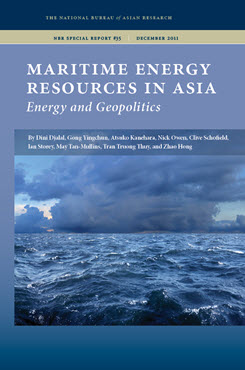The Implications of Seabed Energy Resource Development
The Gulf of Thailand Case
This essay analyzes the experiences and lessons of various stakeholders of the Thai-Malaysian joint development project and pays special attention to the implications of joint ventures on the environment, human welfare, and food security.
EXECUTIVE SUMMARY
This essay analyzes the experiences and lessons of various stakeholders of the Thai-Malaysian joint development project and pays special attention to the implications of joint ventures on the environment, human welfare, and food security.
MAIN ARGUMENT
Traditional security threats, such as contestations and overlapping claims of exclusive economic zones between states, are commonly regarded as potential flashpoints for conflicts in Asia. Where deadlock over overlapping claims exists and there appears to be no prospect of agreement on a boundary line in the near future, joint development offers an ideal way forward. It is often seen as a mutually beneficial solution to ensure security in a region. However, nontraditional security threats and associated developmental costs from these projects demonstrate the need for long-term planning on sustainable development policies. Post–joint agreement issues, such as competing use of the surrounding areas and resources, pollution, and threats to livelihood security remain as major, contentious issues between local residents, oil companies, and government officials. Left unaddressed, these issues can become triggers for conflict, as illustrated by the Thai-Malaysian pipeline episode in southern Thailand. The importance and implications of these nontraditional security issues to the long-term, holistic security and sustainable development of the region should not be underestimated. Furthermore, failure to consider the long-term impacts of joint development area projects has lasting implications for various stakeholders at the local level. In particular, nontraditional security threats such as climate change, food scarcity, and human welfare crises arose during the implementation period and demonstrated the need to incorporate the promotion of sustainable development in international agreements.
POLICY IMPLICATIONS
- States should establish a cooperative security principle and a habit of dialogue at the interstate level to avoid any nontraditional triggers resulting in armed confrontation instigated by disputes over seabed resources.
- A regional body to manage nonliving resources in the Gulf of Thailand should be established.
- When it comes to the joint development of seabed resources, states should move away from sovereignty and territoriality concepts and instead focus on practicality, free market principles, and sustainability.
- The success of projects depends not only on interstate diplomacy and negotiations but also on domestic political stability and good governance. Poor management by weak states, such as Thailand, highlights societal injustices and raises the question of who ultimately benefits from these large-scale projects.


